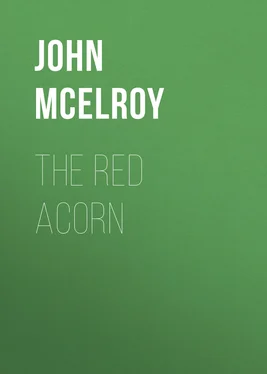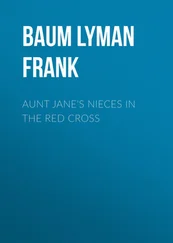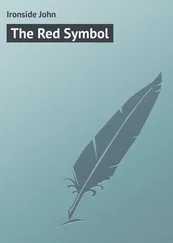John McElroy - The Red Acorn
Здесь есть возможность читать онлайн «John McElroy - The Red Acorn» — ознакомительный отрывок электронной книги совершенно бесплатно, а после прочтения отрывка купить полную версию. В некоторых случаях можно слушать аудио, скачать через торрент в формате fb2 и присутствует краткое содержание. Жанр: foreign_prose, История, foreign_edu, foreign_antique, на английском языке. Описание произведения, (предисловие) а так же отзывы посетителей доступны на портале библиотеки ЛибКат.
- Название:The Red Acorn
- Автор:
- Жанр:
- Год:неизвестен
- ISBN:нет данных
- Рейтинг книги:4 / 5. Голосов: 1
-
Избранное:Добавить в избранное
- Отзывы:
-
Ваша оценка:
- 80
- 1
- 2
- 3
- 4
- 5
The Red Acorn: краткое содержание, описание и аннотация
Предлагаем к чтению аннотацию, описание, краткое содержание или предисловие (зависит от того, что написал сам автор книги «The Red Acorn»). Если вы не нашли необходимую информацию о книге — напишите в комментариях, мы постараемся отыскать её.
The Red Acorn — читать онлайн ознакомительный отрывок
Ниже представлен текст книги, разбитый по страницам. Система сохранения места последней прочитанной страницы, позволяет с удобством читать онлайн бесплатно книгу «The Red Acorn», без необходимости каждый раз заново искать на чём Вы остановились. Поставьте закладку, и сможете в любой момент перейти на страницу, на которой закончили чтение.
Интервал:
Закладка:
Three months of companionship with Ned Burnleigh, and daily imbibation of that young man’s stories of his wonderful conquests among young women of peerless beauty and exalted social station confirmed this feeling, and led him to wish for at least such slackening of the betrothal tether as would permit excursions into a charmed realm like that where Ned reigned supreme.
For the thousandth time—and in each recurrence becoming a little clearer defined and more urgent—came the question:
“Shall I break with Rachel? How can I? And what possible excuse can I assign for it?”
There came no answer to this save the spurs with which base self-love was pricking the sides of his intent, and he recoiled from it—ashamed of himself, it is true, but less ashamed at each renewed consideration of the query.
He hastened home that he might receive a greeting that would efface the memory of the reception he had met with in the street. There, at least, he would be regarded as a hero, returning laurel-crowned from the conflict.
As he entered the door his father, tall, spare and iron-gray, laid down the paper he was reading, and with a noticeable lowering of the temperature of his wonted calm but earnest cordiality, said simply:
“How do you do? When did you get in?”
“Very well, and on the 10:30 train.”
“Did all your company come?”
Harry winced, for there was something in his father’s manner, more than his words, expressive of strong disapproval. He answered:
“No; I was unwell. The water and the exposure disagreed with me, and I was allowed to come on in advance.”
Mr. Glen, the elder, carefully folded the paper he was reading and laid it on the stand, as if its presence would embarrass him in what he was about to say. He took off his eye-glasses, wiped them deliberately, closed them up and hesitated for a moment, holding them between the thumb and fore finger of one hand, before placing them in their case, which he had taken from his pocket with the other.
These were all gestures with which experience had made Harry painfully familiar. He used to describe them to his boy intimates as “the Governor clearing for action.” There was something very disagreeable coming, and he awaited it apprehensively.
“Were you”—the father’s cold, searching eyes rested for an instant on the glasses in his hand, and then were fixed on his son’s face—“were you too ill the day of the fight to accompany your command?”
Harry’s glance quailed under the penetrating scrutiny, as was his custom when his father subjected him to a relentless catechism; then he summoned assurance and assumed anger.
“Father,” he said, “I certainly did not expect that you would join these mean-spirited curs in their abuse of me, but now I see that–”
“Henry, you evade the question.” The calm eyes took on a steely hardness. “You certainly know by this time that I always require direct answers to my questions. Now the point is this: You entered this company to be its leader, and to share all its duties with it. It went into a fight while you remained back in camp. Why was this so? Were you too sick to accompany it?”
“I certainly was not feeling well.”
“Were you too ill to go along with your company?”
“—and—there—was—some—work—in—camp that—needed—to—be—done—and there was enough without me, and—I—I—”
“That is sufficient,” said the elder man with a look of scorn that presently changed into one of deeply wounded pride. “Henry, I know too well your disposition to shirk the unpleasant duties of life, to be much surprised that, when tried by this test, you were found wanting. But this wounds me deeply. People in Sardis think my disposition hard and exacting; they think I care for little except to get all that is due me. But no man here can say that in all his long life Robert Glen shirked or evaded a single duty that he owed to the community or his fellow-men, no matter how dangerous or disagreeable that duty might be. To have you fail in this respect and to take and maintain your place in the front rank with other men is a terrible blow to my pride.”
“O, Harry, is that you?” said his mother, coming into the room at that moment and throwing herself into her son’s arms. “I was lying down when I heard your voice, and I dressed and hurried down as quickly as possible. I am so glad that you have come home all safe and well. I know that you’ll contradict, for your poor mother’s sake, all these horrible stories that are worrying her almost to death.”
“Unfortunately he has just admitted that those stories are substantially true,” said the father curtly.
“I won’t believe it,” sobbed his mother, “until he tells me so himself. You didn’t, did you, back out of a fight, and let that Bob Bennett, whose mother used to be my sewing girl, and whom I supported for months after he was born, and his father died with the cholera and left her nothing, by giving her work and paying her cash, and who is now putting on all sorts of airs because everybody’s congratulating her on having such a wonderful son, and nobody’s congratulating me at all, and sometimes I almost which I was dead.”
Clearness of statement was never one of Mrs. Glen’s salient characteristics. Nor did deep emotion help her in this regard. Still it was only too evident that the fountains of her being were moved by having another woman’s son exalted over her own. Her maternal pride and social prestige were both quivering under the blow.
Harry met this with a flank movement.
“You both seem decidedly disappointed that I did not get myself wounded or killed,” he said.
“That’s an unmanly whimper,” said his father contemptuously.
“Why, Harry, Bob Bennett didn’t get either killed or wounded,” said his mother with that defective ratiocination which it is a pretty woman’s privilege to indulge in at her own sweet will.
Harry withdrew from the mortifying conference under the plea of the necessity of going to his room to remove the grime of travel.
He was smarting with rage and humiliation. His panoply of conceit was pierced for the first time since the completion of his collegiate course sent him forth into the world a being superior, in his own esteem, to the accidents and conditions that the mass of inferior mortals are subject to. Yet he found reasons to account for his parent’s defection to the ranks of his enemies.
“It’s no new thing,” he said, while carefully dressing for a call upon Rachel in the evening, “for father to be harsh and unjust to me, and mother has one of her nervous spells, when everything goes wrong with her.”
“Anyhow,” he continued, “there’s Ned Burnleigh, who understands me and will do me justice, and he amounts to more than all of Sardis—except Rachel, who loves me and will always believe that what I do is right.”
He sat down at his desk and wrote a long letter to Ned, inveighing bitterly against the stupidity and malice of people living in small villages, and informing him of his intention to remove to Cincinnati as soon as an opening could be found for him there, which he begged Ned to busy himself in discovering.
Attired in his most becoming garb, and neglecting nothing that could enhance his personal appearance, he walked slowly up the hill in the evening to Rachel Bond’s house. The shrinkage which his self-sufficiency had suffered had left room for a wonderful expansion of his affection for Rachel, whose love and loyalty were now essential to him, to compensate for the falling away of others. The question of whether he should break with her was now one the answering of which could be postponed indefinitely. There was no reason why he should not enjoy the sweet privileges of an affianced lover during his stay in Sardis. What would happen afterward would depend upon the shape that things took in his new home.
Читать дальшеИнтервал:
Закладка:
Похожие книги на «The Red Acorn»
Представляем Вашему вниманию похожие книги на «The Red Acorn» списком для выбора. Мы отобрали схожую по названию и смыслу литературу в надежде предоставить читателям больше вариантов отыскать новые, интересные, ещё непрочитанные произведения.
Обсуждение, отзывы о книге «The Red Acorn» и просто собственные мнения читателей. Оставьте ваши комментарии, напишите, что Вы думаете о произведении, его смысле или главных героях. Укажите что конкретно понравилось, а что нет, и почему Вы так считаете.












